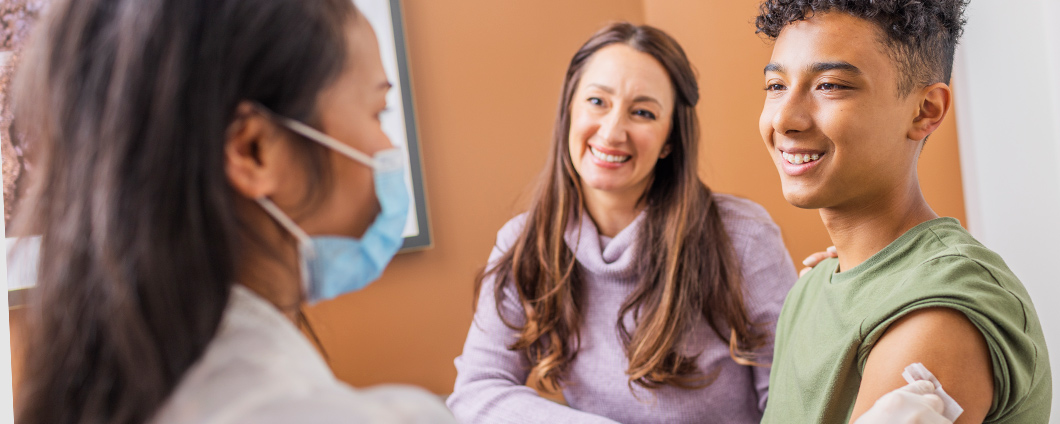Search
Results for 'forms'
Clear-
Renown Pharmacy Vaccinations
Pharmacy Vaccinations by Appointment The Renown Pharmacy team can order additional vaccines with advanced notice. Please call 775-982-7737 before scheduling to check on availability. Renown Pharmacy provides vaccinations by appointment for the following: COVID-19 Bivalent vaccine (Pfizer-BioNTech) Hepatitis B vaccine (HEPLISAV-B) Human Papillomavirus (HPV) vaccine (Gardasil 9) Influenza/Flu vaccine (High dose for 65+ and standard dose for those six months to 64 years) Measles, Mumps, Rubella (MMR) Meningococcal (meningitis) vaccine (Menactra) Meningococcal B vaccine (Trumenba) Monkeypox vaccine (JYNNEOS) Shingles vaccine (Shingrix) Pneumonia vaccine (Pneumovax23 and Prevnar 20) Tetanus, provided though the tetanus, diphtheria and pertussis (Tdap) booster (Adacel) You may request appointments for any of these vaccines within MyChart
-
Businesses: Get Employees Vaccinated Against COVID-19 for Free
Renown Health has been working with the Washoe County Health District, the state, and the CDC to distribute the limited supplies of COVID-19 vaccines. Renown has completed more than 64,000 dose 1 and dose 2 vaccinations to date, which includes all of Tier 1A (Medical Staff members, Renown employees, students and volunteers) and eligible community members – which now includes everyone 16+. “Renown is excited to continue along our goal of providing the opportunity for everyone who is interested in receiving the vaccine to be vaccinated at no charge,” said Tony Slonim, MD, DrPH, President and CEO of Renown Health. “We would like local businesses to know we have thousands of open appointments in early May and we encourage our business colleagues to share this information with employees so they may easily schedule an appointment through MyChart and continue on the path to a healthier and safer northern Nevada.” “Renown is excited to continue along our goal of providing the opportunity for everyone who is interested in receiving the vaccine to be vaccinated at no charge,” said Tony Slonim, MD, DrPH, President and CEO of Renown Health. “We would like local businesses to know we have thousands of open appointments in early May and we encourage our business colleagues to share this information with employees so they may easily schedule an appointment through MyChart and continue on the path to a healthier and safer northern Nevada.” Vaccine appointments for 18+ Anyone ages 18 and older may register for a free Renown Epic MyChart account. They do not need to have a Renown provider to enroll. With a MyChart account, they will be able to login and schedule their first vaccine appointment. These vaccines require two doses. After the first dose of the vaccine is documented in your MyChart account, you will get a notice to schedule your second dose. There are two easy ways to sign up for MyChart. Please see instructions in both English and Spanish. To schedule an appointment for a 16 or 17 year old: We have made special arrangements for minors ages 16 and 17. Please fill out this form, also found on https://covid.renown.org/vaccine/. Renown's Customer Engagement team will call the listed phone number within 14 business days to schedule the appointment. We appreciate your patience during this time as demand is high. Please note that a parent or guardian must accompany the teen when getting their vaccination. You are advised NOT to receive the vaccine if you: Are ill at the time of vaccination (fever, shortness of breath, vomiting, diarrhea or acute illness). Have been diagnosed with COVID-19 in the previous 14 days. Have received any other vaccination in the last 14 days. Have a history of significant allergic reaction to this vaccine or any of its ingredients. “Hometown Health is proud to be part of an organization offering COVID-19 vaccines to our community at no cost,” said David Hansen, CEO, Hometown Health. “The business community in northern Nevada is an important piece of the vaccination puzzle, and as a community-focused organization, we are pleased that Renown can safely offer vaccinations to local businesses and contribute to an increased hope for the future.” Renown will provide additional updates on our websites at covid.renown.org. Please see b-roll, photos and fly-over footage of our Drive-Thru COVID-19 Vaccination Clinic here. About Renown Health Renown Health is the region’s largest, locally governed, not-for-profit integrated healthcare network serving Nevada, Lake Tahoe and northeast California. With a diverse workforce of more than 7,000 employees, Renown has fostered a longstanding culture of excellence, determination and innovation. The organization comprises a trauma center, two acute care hospitals, a children’s hospital, a rehabilitation hospital, a medical group and urgent care network, and the region’s largest, locally owned not-for-profit insurance company, Hometown Health. Clinical institutes include; Cancer, Heart and Vascular Heath and Neurosciences. Renown is currently enrolling participants in the world’s largest community-based genetic population health study, the Healthy Nevada Project®. For more information, visit renown.org
Read More About Businesses: Get Employees Vaccinated Against COVID-19 for Free
-
6 Healthcare Action Items for the LGBTQIA+ Community
Every patient, regardless of how they may identify, greatly benefits from preventive healthcare and early detection. Members of the LGBTQIA+ community face unique considerations when it comes to their health, and a proactive approach to preventive screenings and vaccines is important in order to address their individual health needs. Dr. Karen Thiele, Family Medicine Physician with University Health and Assistant Professor of Family and Community Medicine at the University of Nevada, Reno School of Medicine, breaks down key steps that LGBTQIA+ patients should take to safeguard their health. PrEP and PEP Pre-exposure prophylaxis (PrEP) is a strategy to prevent human immunodeficiency virus (HIV) infection. It is an important measure for those who are HIV-negative but may be at risk of contracting it. The highest risk sexual practice is receptive anal intercourse, due to the relative fragility of rectal tissue. This medication can stop HIV from spreading in the body and help patients maintain their HIV-negative status. PrEP is available in both pill form, which is taken every day, and injection form, of which the first two injections are initiated one month after another while all other injections are initiated every two months. Post-exposure prophylaxis (PEP) is an antiretroviral drug regimen taken after potential HIV exposure to prevent an HIV-negative individual from converting to HIV-positive status. PEP is only for emergency situations and must be started within 72 hours of exposure – sooner is always better than later – and must be taken for 28 days. PrEP and PEP are available in many ways, including visiting your primary care provider (PCP) or an urgent care location. HPV Immunization All genders and identities can protect themselves against human papillomavirus (HPV), a sexually transmitted infection (STI) that can lead to the risk of cervical, mouth, head, neck, throat, anal, vaginal, penile and vulvar cancers. HPV is so common that nearly all sexually active people, regardless of sexual orientation and practices, will be exposed at some point in their lifetime. The HPV vaccine (common brands include Gardasil and Cervarix) is a safe and effective method to prevent HPV, according to the Centers for Disease Control and Prevention (CDC). This vaccine protects against infections that can lead to HPV-related cancers and precancers, as well as genital warts. While patients should start receiving the vaccine at 9 years old years old, unvaccinated adults up to the age of 45 can also receive the vaccine through their PCP – better late than never! STI Testing Sexually-transmitted infections form from bacteria, viruses or parasites that can be transmitted by person-to-person sexual contact through semen, vaginal, blood and other bodily fluids. According to the U.S. Department of Health and Human Services, there are more than 20 million estimated new STI cases across the nation each year. Luckily, most STIs are preventable. Annual STI testing for HIV, gonorrhea, chlamydia and syphilis is important to stay on top of your sexual health. Because these STIs may sometimes have no symptoms, screening is recommended regularly and with any change in sexual partners. Depending on the specific condition, tests for these infections include urine, swab and blood tests. Speak with your primary care provider on a screening schedule that works best for you. Prostate Exams Prostate exams look for early signs of prostate cancer in patients who still have a prostate. The CDC recommends those who are at least 55 years old get regular prostate screenings; however, for patients with a family history of prostate cancer, screenings may be recommended as early as 45 years old. These exams are done via two common methods – a prostate specific antigen (PSA) blood test and a digital rectal examination (DRE). Your provider can help you determine your risk and when you should start getting screened. Pap Tests and Pelvic Exams Patients of all genders who have a cervix, uterus, vagina and/or ovaries will benefit from regular pelvic exams and Pap screenings. A pelvic exam consists of a provider looking inside the vagina and at the cervix for anything unusual. A Pap test, also known as a Pap smear, involves your provider using a small, soft swab to collect cervical cells to check for early signs of cancer. Generally speaking, people with these organs should have a Pap test every three years starting at age 21 through the age of 30. After age 30, patients should receive a Pap test with HPV co-testing every five years until age 65. These recommendations are changing based on new research, so it is important to have a conversation with your PCP about the current guidelines so you can make an informed choice about what schedule you should follow. A gynecologist or your primary care provider can counsel you and perform these screenings. Mammograms and Breast Exams People with breast tissue, especially dense breast tissue, are at risk for breast cancer, and regular breast screenings are your best line of defense. At-home breast self-exams are the first step – you will want to check your breasts for any lumps, changes, fluid leaks, irregular tissue thickening or anything else that feels unusual. The Breast Cancer Risk Assessment tool, provided by the National Cancer Institute, is a good place to start to identify your risk. Talk with your primary care provider about the risks and benefits of starting screening at age 40 so you can make an informed decision about when to start. If you have any family history of breast or ovarian cancer, your PCP will offer you genetic testing for BRCA 1 and 2 mutations. Nevadans over the age of 18 can also get BRCA genetic test for free by enrolling in the Healthy Nevada Project. Mammograms are important screening tools, but for a significant portion of people with breast tissue, density of the breast tissue may make mammograms less helpful in detecting cancer. Your primary care provider can help you decide what additional imaging (such as breast ultrasound) might be best for you.
Read More About 6 Healthcare Action Items for the LGBTQIA+ Community


